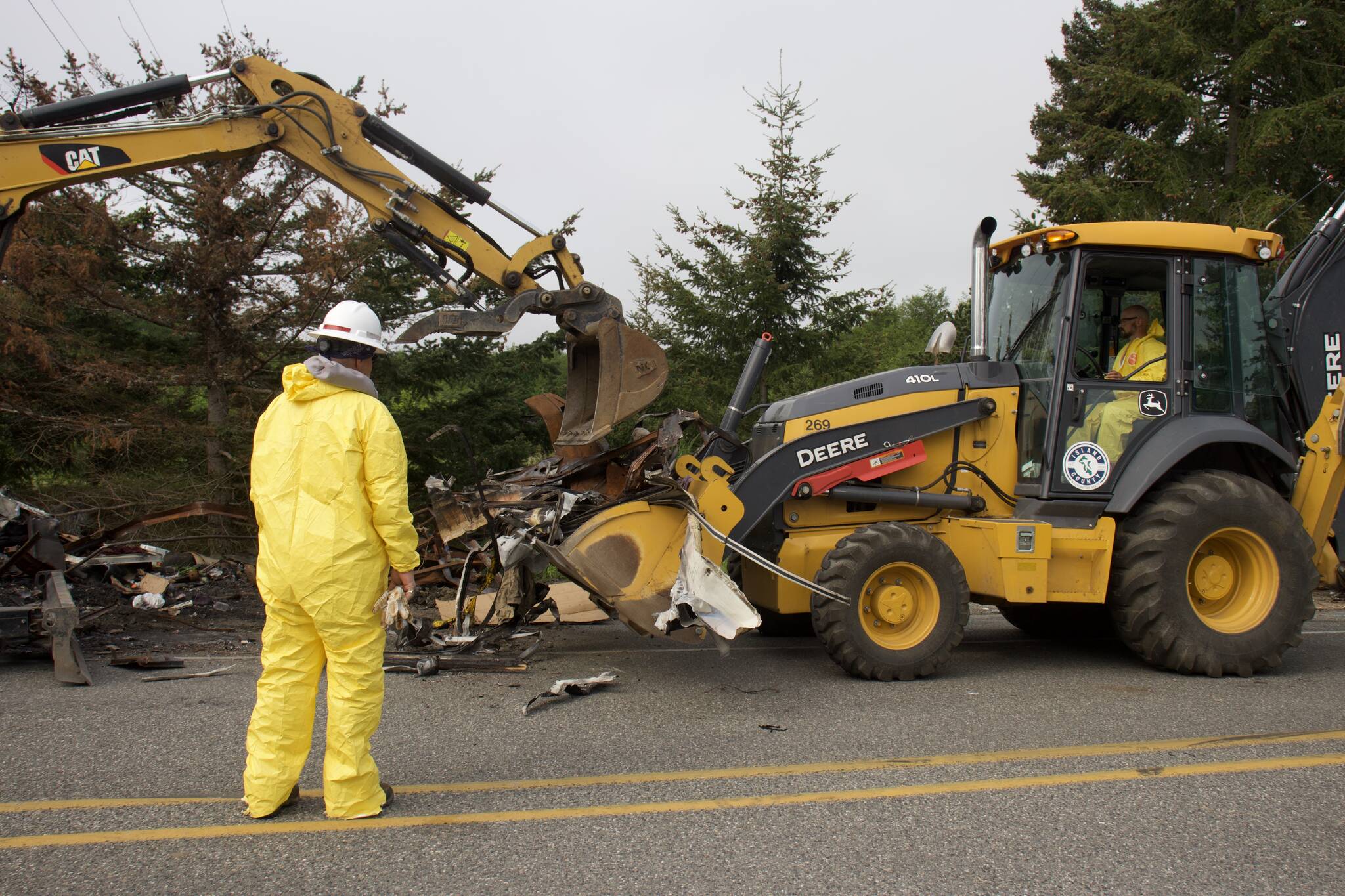Hoffman Road on North Whidbey was closed Wednesday to allow for a large trash cleanup of a growing homeless camp that’s raised concerns among property owners and Island County officials.
Several heavy equipment vehicles lifted garbage into large dumpsters. Island County Public Works employees, dressed in hard hats and yellow hazmat suits, collected smaller items with shovels. Clothes, furniture and the remains of a burnt-out trailer were among the trash hauled off.
While the garbage is gone, residents of the camp are staying. Island County Sheriff Rick Felci said the department was not doing a typical homeless camp sweep and simply disposing of the “literally hundreds of bags of garbage” that have built up on the sides of the road.
Legally, the sheriff’s office cannot remove people because of case law that protects the rights of homeless people. Martin v. Boise, a 2018 decision by the U.S. Court of Appeals for the 9th Circuit, states that anti-camping ordinances cannot be enforced on public property if not enough homeless shelters are available. Additionally, the City of Seattle v. Long was a 2021 Washington Supreme Court decision that states a vehicle cannot be impounded if someone is using it as a residence.
The garbage dumping, however, is illegal. Felici said that he had found garbage clearly not left by residents of the camp, including a large commercial freezer and a jet ski. He said it was obvious that community members had taken the opportunity to dump their own trash at the camp.
Along with the clean-up crew, members of Island County Human Services were present to provide resources to the camp’s residents.
William Larson, deputy director of Island County Human Services, said his department was there to provide immediate needs, such as food, first aid and clothes, as well as access to resources for long-term solutions.
Volunteers of WAIF were present to check on animals. Shelter Coordinator Donna Dunn provided flea treatment to two cats living in someone’s car.
Chris Matochi, the living environments supervisor for Island County Public Health, said the cleanup was a county-wide effort and one of the biggest projects the departments had ever collaborated on. He said over 40 county employees were present, along with people from SPIN Cafe.
“We want to send the message that Island County actually views them and sees them as people and (we’re) trying to provide resources that will hopefully help them make the right choice for their lives,” Matochi said.
He said that it would be pointless to make people leave the area as another homeless camp would simply pop up somewhere else. He said it’s easier to have them in one spot where human services and the sheriff’s office are able to monitor them.
Because the camp is on public property, the county was able to obtain grant money from the state Department of Ecology to provide a dumpster and port-a-potties for the residents, Matochi said.
The response from members of the camp was generally positive.
Alvin Kent, a 72-year-old Vietnam veteran and resident of the camp, called it a “great idea” and said it would solve a lot of problems. Kent said he plans to stay at the camp and he is “up in the air” about whether or not he will leave in the future.
Aaron Shaeffer, another resident, sleeps in a tent on the side of the road. He moved to the area from Eastern Washington but lost his apartment when his roommate stopped paying rent, he said. From there, he couch surfed before camping in state parks. That became too expensive so he now stays on Hoffman Road. Shaeffer also said he was grateful for the cleanup.
“To wake up every morning and look at that, is a nightmare,” he said, referring to the piles of trash. “It’s an absolute nightmare.”
Shaeffer said he hopes the cleanup ends the animosity that the city feels toward the camp. When he first arrived on Hoffman, he saw barely any cars drive by. Now, people frequently speed down the street and could easily run someone over, he said.
Despite the presence of Island County Human Services, both men said they had not spoken with the employees about receiving resources. Kent said he is “already on every list” and still has to live on the street. Shaeffer said there are not a lot of resources available for single men even though he has attempted to get help. Kent and Shaeffer said they prefer to look out for each other. To them, the Hoffman Road camp is a community.
Felici said he wants residents to understand that the county is doing its best and will continue to diligently monitor the area.
“I kind of got tired of telling the community there’s nothing we can do here,” he said.



